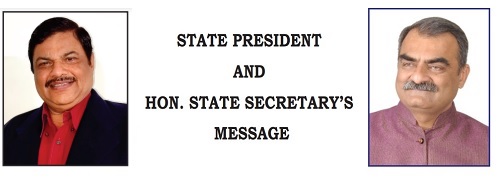June 2023 Issue

Dear IMA GSB Friends,
Seasons’ Greetings. Wishing you Happy RathYatra in advance.
Wishing you Happy Gurupurnima & Mohrram Mubarak in advance.
“Aao Gaon Chale…”, our beloved Dr. Ketan Desai’s this dream project was relaunched very well, in the right spirit. We all felt proud that this activity took off at not only in Gujarat State, but equally well all over India.
Depending on membership strength of each branch, they adopted one or more villages, taking up onus and health responsibility of that village for the whole year.
It is worrisome that, recently, more and more young & healthy doctors are succumbing to sudden deaths. Over stress, competitive and hyper-lifestyle, unhealthy and excessive food intake, dyslipidemia and obesity and sedentary life style with lack of physical exercises seem to be reasons for this. We all, especially those who are between age 35-60 should seriously consider improving life & food style.
Sudden cardiac deaths amongst young doctors – where are we heading?
The news of loss of our young doctor colleagues due to acute myocardial infarction in the recent past is very unfortunate and shocking. These incidents are becoming more frequent and are certainly cause for concern for all of us. Even seemingly it young individuals also succumb to heart attacks these days. There are number of examples with celebrities, ilm stars and even athletes, becoming the victims of acute myocardial infarction or sudden cardiac deaths. Many of them were very successful professionals and are at the peak of their career.
Sudden Cardiac Death (SCD) in young adults remains a tragic and sudden event that greatly affects families and communities. Not long ago, heart attacks were primarily a problem faced by older adults. It was rare for anyone younger than 40 to have a heart attack. Now 1 in 5 heart attack patients are younger than 40 years of age.
The exact cause of such sudden deaths amongst young doctors remains unknown; but many risk factors are known to play some role in precipitating such events.
Elevated blood pressure is a well-established cardiovascular disease risk factor. If your blood pressure is too high for too long, it can damage your arteries. The researchers have found that young adults with raised blood pressure levels were at higher risk for late-life coronary heart disease. In other words, managing blood pressure when you are younger really matters People with type 2 diabetes are more likely to have a heart attack. In fact, if you have diabetes, you are twice as likelyto have heart disease than someone who doesn’t have diabetes. Unfortunately both diabetes and hypertension can be present silently and without any symptoms !
Obesity, smoking, poor lifestyle, sedentary living, erratic diet and lack of sleep and exercise high cholesterol levels are also known risk factors. High cholesterol levels make young adults a prime target for heart attacks. So preventive health checks to detect your cholesterol levels would have deinite value in identifying and managing this risk factor.
COVID 19 pandemic has also been blamed for increased incidence of cardiac conditions. A 2022 study of 150,000 people with COVID-19 showed that even a full year after initial infection, the risk for developing a heart condition, such as arrhythmias, heart failure, inlammation, or heart attack, was “substantial.”
Family history plays an important role and you cannot change your genes!Heart disease risk rises if you have a parent or sibling with a history of heart disease before the age of 55 for men or 65 for women.Over the last 10 years, there has been a sharp rise in the number of young people suffering heart attacks. And such episodes happen earlier among Indians than the rest of the world population.
Currently Indians suffer four times more heart attacks than Americans and 20 times more than the Japanese Mental health issues such as depression, anxiety and stress are the outcome of our modern life style and iercely competitive work environment. Stress levels amongst doctors continue to remain high. Endogenous cortisol level is directly proportional to the level of stress. On an average, 15 to 20 mg cortisol gets secreted in normal stress of human beings. This gets increased up to 150 mg under maximum stress. A study has shown that our surgeons and anaesthesiologists in India exceed this 150 mg level frequently in a day. These levels are more than what is found in the military colonel in active duty in the battleield! We should actively consider frequent breaks from our stressful busy schedules. Being workaholic is not a virtue any more!
It is high time for all doctors and medical students to take care of themselves,to eat healthy diet, take timely meals, get adequate sleep, undertake regular physical exercises, undergo preventive health checks and distress themselves frequently from their busy work schedule.
Jay IMA, Jay Garvi Gujarat, Jay Hind.
For more information download bulletin PDF








